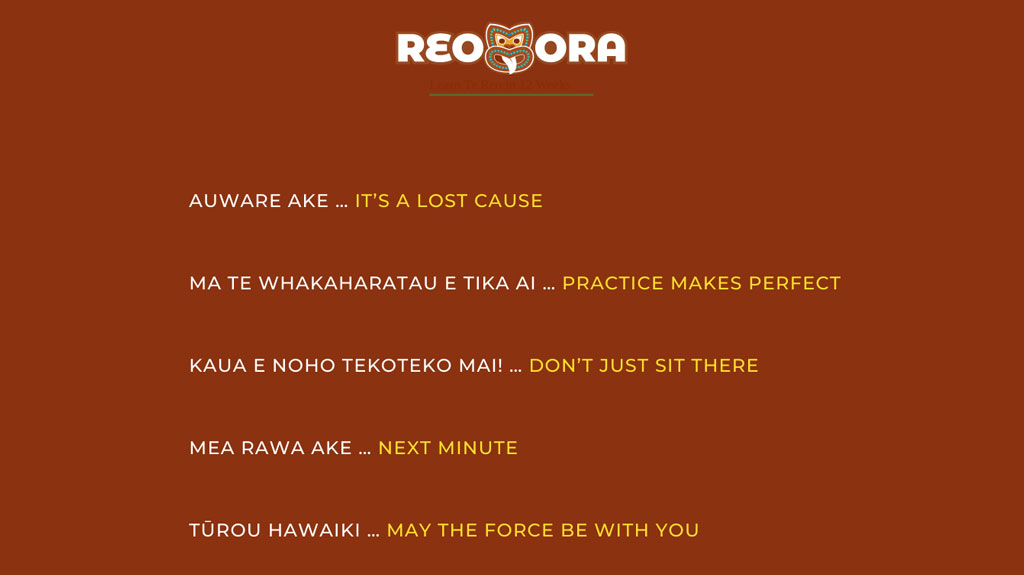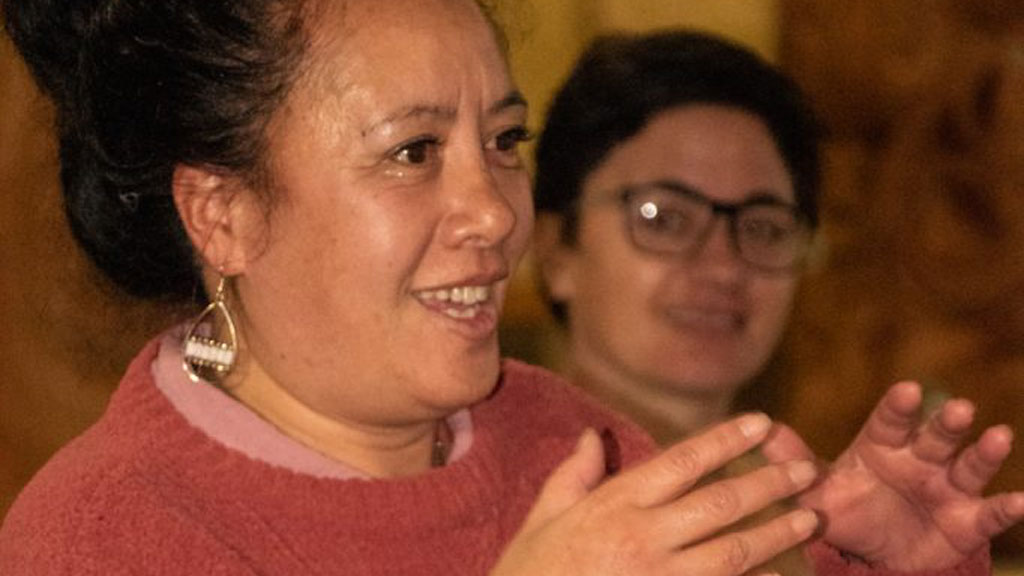
24 Sep How to Overcome Barriers in Learning Te Reo Māori
There are many barriers, obstacles, or mental blocks that people may experience when endeavouring to learn a new language. In my experience as a Māori language lecturer, I have encountered and understand the many difficulties that learners of Te Reo Māori face in learning a new language. One of the biggest impediments for new learners of Te Reo, is the fear of mispronouncing a Māori word or phrase, in public. For example, how many people, can correctly pronounce a name like “Mr. Rangitauira” or “Miss Tūwhakairiora”, without embarrassing themselves or the person they are dealing with? How many people could accurately write down the above names, without asking the person, how to spell it out, letter by letter.

Another barrier that non-Māori Te Reo learners face is being perceived as culturally insensitive or disrespectful towards Māori, by accidentally mispronouncing words, phrases, or personal names. This fear of making a mistake in public also applies to Māori people who do not speak Māori. In fact, for Māori learners, it is worse, because there is an added cultural pressure of not knowing how to speak their own language and being judged by Māori speakers as “kūware” or ignorant.
Yet another barrier that learners of Te Reo encounter are fear of speaking Māori in front of fluent speakers of Māori. I recall teaching Te Reo classes at Auckland University which contained a mixture of beginner speakers and fluent/native speakers of Te Reo. When we conducted group exercises with a beginner speaker and fluent speaker together, I immediately noticed that the beginner speaker was so intimidated by the fluent speaker that they could not even hold a conversation in Māori. They immediately “froze” up and could not quite say the words they wanted to say without becoming self-conscious.
Every learner has their own preferred style of learning. Some prefer total immersion classes while others prefer to learn grammar. Some prefer to learn in a marae setting, while others prefer a classroom environment. In the last few months, we have seen a rise in the number of people who, because of Covid-19, have taken up online learning, and using online platforms like Zoom. Whatever your preferred learning style, you will never learn to speak a new language unless you genuinely want to learn that language. I hear people say to me, all the time, “I wish I could speak Māori” or “I need to learn Māori”, but will not make the effort, or the time, to actually go and learn the language. As we say in Māori – “Auware ake” – “It’s a lost cause, it’s a waste of time” because if you are not going to make the effort to learn then why bother.

Another excuse I hear all the time is “I don’t have the time to learn”. Well, if you can’t make the time to learn the language and commit yourself to studying at least 4 hours per week – “Auware ake” – “It’s a lost cause”. Indeed, I have heard every excuse under the sun as to why people cannot learn Te Reo Māori. At the end of the day, you are either committed to learning a language, or you are not. If you are serious about learning Te Reo but have experienced the difficulties or barriers I have described above, then the next question is – “What are you going to do about it?”. You have two choices. First, you can do nothing about it. Second, you can go find help from someone or somewhere, to learn the language.
There are many courses available out there for people who are serious about learning, from universities, polytechnics, wānanga to Aunty Rangi’s class on Tuesday. The next question which arises, is “where do I learn?”. Many learners try different courses but cannot seem to gain fluency. Even after years of learning, they still cannot hold a conversation, in Māori, for more than 5 minutes. This may be through no fault of their own, or due to a combination of factors (e.g. lack of time, too busy) which may interfere with or impede their efforts to become fluent in the language. Whatever your situation is, if you are serious about it, just get out there and learn it and do not stop until you become fluent. Remember, “Rome was not built in a day”, and learning any new language is a life-long journey. You might become fluent, but if you do not use it, you will lose it. The old saying applies here “Use it or lose it”.
The next question to consider, once you have made the decision to learn, is “how do I learn?’. As I explained in my previous blog, there are two ways of learning Te Reo, the old way and the new way. You can learn the old way, and attend physical classes like I described earlier, or you can learn the new way which is by online courses. The way our programme works uses the new way of learning which is online. However, we do not say that our way is better than the old way of learning but can be a good complement to the old way of learning. So, if you decide you prefer the new way of learning, which is online learning, then consider our online course – Reo Ora, as an option or as a complement to traditional classes. Our programme does not seek to replace real tutors with an app or a computerised programme but combines technology with “live” online classes with a “real” tutor.
Okay, now you may have decided that you want to learn Te Reo through our Reo Ora online course. So, here’s my question to you – “Why should Reo Ora help you learn Te Reo?” – “Why can’t you learn Te Reo on your own, or through your own efforts?”. The most common response to this question is – “I can’t do it on my own”. My response is “we can help you to help yourself learn Te Reo”. However, we can help you, only if you are committed to learning and will make the time and the effort to learn, otherwise “Auware ake!”. To determine how serious someone is about learning Te Reo, the next question we ask is this:
On a scale of 1-10, 1 meaning you are not interested, 5 meaning you are somewhat interested, 8-10 – meaning you are very to extremely interested, where are you on the scale? If they say a number between 1-7, then we know they are not really serious about learning Te Reo. Our reply to those who say a number between 1-7, is thank you …. but we cannot help you… On the other hand, if they reply with a number between 8-10, we are more than happy to teach you Te Reo with our Reo Ora online course.
For those who are still undecided or who are not really interested in learning Te Reo, we are not trying to convert you to learn Te Reo or to sell you a product or a service. We are about helping achieve a future, where over 1 million New Zealanders speak at least basic Te Reo, by 2040. Reo Ora are passionate about revitalising Te Reo Māori and to help all people, regardless of their ethnicity, to speak at least basic Te Reo in 12 weeks.
Having described the various issues and dilemmas which face those who are interested in learning Te Reo Māori, here are three tips that may help you in beginning your journey:
- Actively seek out a skilled tutor or quality programme that will help you learn to pronounce Māori words and phrases correctly.
- Practice makes perfect. Practice the words and phrases you learn with a friend, a colleague, or a family member.
- Do not overthink it, just speak it. Do not worry if you might say it wrong, just say it or speak it without fear of making a mistake. People will respect you for trying.
Learning Māori language, the new way is fun, interactive and will keep you engaged using online technologies and social media. The new way of learning Te Reo is the way of the future. To demonstrate how fun it can be, let me explain five simple sayings in Māori, known as ‘kīwaha’ that you can use in everyday situations:

“Kīwaha” or colloquialisms, slangs, witty sayings, one liners are part of our everyday language in English or any language for that matter. For example – “Next minute…” and “Sweet as…” are iconic Kiwi slangs, that only Kiwis use in New Zealand. While I lived in the USA, Americans could not understand me when I said “Sweet as…” as it peculiar to New Zealanders. In Māori we have hundreds such slangs or “kīwaha” and we even have “kīrehu”, which are secret sayings which only certain tribes use, and which are peculiar to their particular area or tribe. For example, in my tribe, Tūhoe, we use a kīrehu “Ehara” which means “Absolutely yes”, as in “Kei te makariri! It’s cold!” – “Ehara! – Absolutely yes”. In other tribes “Ehara” means the opposite – “No” or “Not”. There are hundreds of examples of kīrehu in Kiwi English like: “Chur, chur..”, “Mean..”. “That’s cake…”., which are not commonly known or are localised sayings/ slangs.
The point here, is that learning a language can be fun and easy, if one can learn to overcome the barriers of learning a new language. Learning how to pronounce Māori words correctly is the single biggest problem facing learners who are native English speakers. This is not the fault of the learner themselves. Linguists claim that it is all about our phonetic system. While we are children, we all develop a certain phonetic system which allows us to speak a language and make the sounds of that language. Our phonetic system is usually developed by the age of 7, so if we have not been exposed to any other language, but English, by age 7, we have to retrain our phonetic system to say the words of the new language. For example, a place name like “Taupō” can be a struggle for a new learner of Te Reo, because of two phonetic issues. First, “tau” is pronounced like “toe” as in “big toe” and “pō” is pronounced like “paw” as in “cat paw”. When native English speaking learners see the word, Taupō, the will read it as:“Tau” as in “how” and “pō” as in “though”. Why is that? This is because, when we are taught the English alphabet as kids, the English “o” (though, so, know) is pronounced differently to the Māori ‘ō’ (paw, saw, law). Therefore, when learning te reo, we must retrain your brain, and phonetic system, to read “Taupō” as “Toe _ paw”. There are hundreds of other examples I could give you, but as stated earlier, at the end of the day, it is personal choice for people to learn a language, and a big commitment.
There are many ways, people can learn Te Reo these days, however, the new way of learning Te Reo Māori, with our online course, Reo Ora, is an innovative and fun way to learn the language. The features of our online course are explained in this little video clip you can watch below.
Everyone has their own preferred style of learning and one must decide “Is this new way of learning Te Reo, my preferred style of learning?”. You can find out more about the Reo Ora online language courses and join our Reo Ora Facebook group. We are here to help those of you, who are genuinely committed, to successfully learning Te Reo Māori. Learning Te Reo is made easy with our programme and one can learn Te Reo in 12 weeks, using our online course. Within Te Ao Māori, the Māori world, and perhaps wider New Zealand society, those who speak the Māori language fluently are highly regarded for being bilingual (English and Māori) rather than just being monolingual (English only). Whether you want to remain monolingual or become bilingual, is entirely up to you. To conclude, below is a proverb that may inspire you to become fluent in Te Reo Māori.
“Ko te kai a te rangatira, ko te reo Māori”
“The food of chiefs, is the Māori language”

Kāti i konei ngā kōrero, tēnā koutou katoa.
Nāku noa nei.
Nā Dr. Rāpata Wiri
